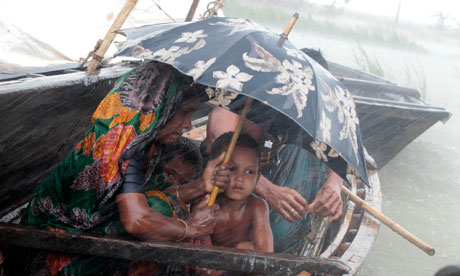Climate crisis: why business must do more to protect children’s rights
The effects of climate change have a disproportionate impact on children and place an ecological debt on future generations
- Guardian Professional, Friday 14 September 2012 16.07 BST
- Jump to comments (4)

In the wake of the continuing negotiations on climate change in Bangkok last week, businesses need to take action to improve the outcomes for future generations.
Number seven of the Children’s Rights and Business Principles launched by Unicef earlier this year is related to the environment. This has global relevance for all businesses, since all business activities impact directly or indirectly on the world that our children will inherit.
On a recent trip to Bangladesh, I found that climate-related disasters such as flooding were already having an effect on children’s lives. The country is making efforts to build multi-purpose cyclone shelters, which are also being used as schools. Yet these cyclone shelters, while necessary, may not be sufficient to protect the children in Bangladesh if the world is heading for global warming of more than 3°C.
The effects of climate change have a disproportionate impact on children as well as other vulnerable groups. Children and women are 14 times more likely to be killed in a disaster. Save the Children has found that half of all those affected in an emergency are children, and that an increase in climate-related disasters would mean millions would die or be forced to flee from their homes.
Climate change particularly affects agriculture and contributes to rising food prices. Unfortunately, children are particularly vulnerable to this, since malnutrition is already the underlying contributing factor in about one third of all child deaths. The global food crisis of 2008 had a huge impact on child and infant mortality.
Ecological debt
Like financial debt, ecological debt places a burden on children and future generations. This links to the debate over the recent financial crisis. There have been calls for businesses and investors to consider the triple bottom line of social, environmental, and economic sustainability – and to reward long-term value creation over the fast buck.
At the recent Rio+20 Conference, countries reiterated their commitment to protect the climate “for the benefit of present and future generations of humankind”. Should companies also consider this principle of intergenerational equity?
This principle would mean markets and businesses supply the needs of today, without disregarding the needs of tomorrow. Damaging ecosystems and making species extinct leaves an unwelcome legacy. There is the unsettling possibility that this generation might leave the Earth in a worse state than they found it. The recent study in Nature showed humanity may already be overstepping various planetary boundaries, including on biodiversity, nitrogen and climate change. Scientists have also warned that remaining deposits of several irreplaceable and finite mineral resources are being fast depleted.
Sourcing and supply chains
These business-as-usual trends will not just have external impacts, but systemic impacts that harm us all. Recognising the rights of children means companies should consider sourcing from renewable materials, as well as ensuring materials can be re-used, to preserve vital natural resources. Companies with global supply chains may also consider the impact of global operations on vulnerable communities.
For example, Fairtrade coffee companies have been working with their producers down the supply chain to help them become more resilient. The Fairtrade Foundation highlights that rising temperatures would be a disaster for the coffee industry. Reducing the vulnerability of children is low-cost, like ensuring a water supply, and can help develop skills across communities over a long time period.
In the UN climate talks in Bangkok earlier this month, the governments of high-emitting countries continued to avoid tackling the issue, often citing financial or competitiveness concerns. Yet in an interconnected world, all businesses will be affected by the emerging challenges for water, food and energy under climate change – of which the 2008 crisis may be a precursor.
The challenges for businesses are similar to those for governments and individuals: the tendency to focus on short-term rather than long-term concerns. The recession may have made this more difficult. However, with energy and input prices rising, there are clearly opportunities for businesses that move towards green growth. Innovative circular business models will reduce risks in a world where inputs are constrained.
Previously, corporate considerations of impacts on children were mainly limited to concerns about child labour or health. As the world begins to be hit by climate change, water and resource scarcity, as well as financial crisis, business leaders are in the pivotal position to make decisions that consider wider sustainability and respect the rights of children.
In the end, relying on growth that degrades basic resources will not only lead to catastrophe for our children but it is not a sustainable business model either.
Helena Wright is a doctoral researcher at Imperial College London and has attended the UN talks on climate change.
This content is brought to you by Guardian Professional. Become a GSB member to get more stories like this direct to your inbox
